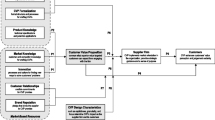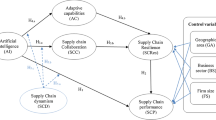Abstract
The research goal of this study was to investigate how supply chain partnerships and customer orientation affect the operational performance of food service companies by moderating flexibility. In total, 725 invitation messages were mailed to members of Ihergo, Groupon, 17P, of which, 166 were returned (a return rate of 22.9 %). Structured equation modeling with PLS analysis allows empirical assessment of the measurement model used in this study. Companies will redefine their business models by connecting suppliers’ and customers’ view, and by integrating customers’ opinions and queries for the planning and development of new products. Linkage efficiency suppliers will reduce inventory and decrease perishable for food service companies based on the driving force to buy in the virtual environment. Product innovation and reduction of the time to market by supplier integration and customer integration are important to food service companies, and flexibility plays an important role in food service companies.



Similar content being viewed by others
References
Al-jawazneh BE (2012) Manufacturing flexibility and operational performance of pharmaceutical manufacturing companies in Jordan. Int J Bus Manage 7(4):181–194
Carte TA, Russell CJ (2003) In pursuit of moderation: nine common errors and their solutions1. MIS Q 27(3):479–501
Chin WW, Marcolin BL, Newsted PR (2003) A partial least squares latent variable modeling approach for measuring interaction effects: results from a Monte Carlo simulation study and an electronic-mail emotion/adoption study. Inf Syst Res 14(2):189
Chuang S-H, Lin H-N (2013) The roles of infrastructure capability and customer orientation in enhancing customer-information quality in CRM systems: empirical evidence from Taiwan. Int J Inf Manage 33(2):271–281
Cross RG, Higbie JA, Cross DQ (2009) Revenue management’s renaissance. Cornell Hosp Q 50(1):56–81
Dolores López-Gamero M, Claver-Cortés E, Francisco Molina-Azorín J (2011) Environmental perception, management, and competitive opportunity in Spanish hotels. Cornell Hosp Q 52(4):480–500
Eichentopf T, Kleinaltenkamp M, van Janine S (2011) Modelling customer process activities in interactive value creation. J Ser Manage 22(5):650–663
Elia E, Lefebvre LA, Lefebvre E (2006) Focus of B-to-B e-commerce initiatives and related benefits in manufacturing small- and medium-sized enterprises. IseB 5(1):1–23
Fantazy KA, Kumar V, Kumar U (2010) Supply management practices and performance in the Canadian hospitality industry. Int J Hosp Manage 29(4):685–693
Feng T, Sun L, Zhu C, Sohal AS (2012) Customer orientation for decreasing time-to-market of new products: IT implementation as a complementary asset. Ind Mark Manage 41(6):929
Fornell C, Larcker DF (1981) Evaluating structural equation models with unobservable variables and measurement error. J Mark Res (pre-1986), 18(000001):39
Franke J, Stockheim T, König W (2005) The impact of reputation on supply chains. An analysis of permanent and discounted reputation. IseB 3(4):323–341
Furlan A, Romano P, Camuffo A (2006) Customer-supplier integration forms in the air-conditioning industry. J Manuf Technol Manage 17(5):633–655
Gallear D, Ghobadian A, Chen W (2012) Corporate responsibility, supply chain partnership and performance: an empirical examination. Int J Prod Econ 140(1):83
González-Benito J (2007) Information technology investment and operational performance in purchasing. Ind Manage Data Syst 107(2):201–228
Grawe SJ, Chen H, Daugherty PJ (2009) The relationship between strategic orientation, service innovation, and performance. Int J Phys Distrib Logist Manage 39(4):282–300
Han H, Kim W (2009) Outcomes of relational benefits: restaurant customers’perspective. J Travel Tour Mark 26(8):820–835
Harrington RJ (2005) The how and who of strategy making: models and appropriateness for firms in hospitality and tourism industries. J Hosp Tour Res 29(3):372–395
Hayes A, Matthes J (2009) Computational procedures for probing interactions in OLS and logistic regression. Behav Res Methods 41(3):924–936
Hsiao KL, Lin J, Wang XY, Lu HP, Yu H (2010) Antecedents and consequences of trust in online product recommendations: an empirical study in social shopping. Online Inf Rev 34(6):935–953
Hulland J (1999) Use of partial least squares (PLS) in strategic management research: a review of four recent studies. Strateg Manag J 20(2):195
Jayawardena C, White A, Carmichael BA (2008) Binational tourism in Niagara: insights, challenges and the future. Int J Contemp Hosp Manage 20(3):347–359
Johnston DA, Wright L (2004) The e-business capability of small and medium sized firms in international supply chains. IseB 2(2–3):223–240
Katunzi TM (2011) Obstacles to process integration along the supply chain: manufacturing firms perspective. Int J Bus Manage 6(5):105–113
Kaya E, Azaltun M (2012) Role of information systems in supply chain management and its application on five-star hotels in Istanbul. J Hosp Tour Technol 3(2):138–146
Kim BY, Oh H, Gregoire M (2006a) Effects of firms’ relationship-oriented behaviors on financial performance: a case of the restaurant industry. J Hosp Tour Res 30(1):50–75
Kim WG, Lee Y-K, Yoo Y-J (2006b) Predictors of relationship quality and relationship outcomes in luxury restaurants. J Hosp Tour Res 30(2):143–169
Kim M, Suresh NC, Kocabasoglu-Hillmer C (2013a) An impact of manufacturing flexibility and technological dimensions of manufacturing strategy on improving supply chain responsiveness: business environment perspective. Int J Prod Res 51(18):5597–5611
Kim M-J, Lee C-K, Chung N (2013b) Investigating the role of trust and gender in online tourism shopping in South Korea. J Hosp Tour Res 37(3):377–401
Kothari T, Hu C, Roehl WS (2005) e-Procurement: an emerging tool for the hotel supply chain management. Int J Hosp Manage 24(3):369–389
Kothari T, Hu C, Roehl WS (2007) Adopting e-Procurement technology in a chain hotel: an exploratory case study. Int J Hosp Manage 26(4):886–898
Krathu W, Pichler C, Xiao G, Werthner H, Neidhardt J, Zapletal M, Huemer C (2014) Inter-organizational success factors: a cause and effect model. Inf Syst e-Bus Manage. doi:10.1007/s10257-014-0258-z
Ku ECS, Yang C-M, Huang M-Y (2013) Partner choice: adaptation of strategic collaboration between travel agencies. J Hosp Tour Res 37(4):516–536
Laaksonen T, Jarimo T, Kulmala HI (2009) Cooperative strategies in customer–supplier relationships: the role of interfirm trust. Int J Prod Econ 120(1):79–87
Lai K-H, Wong CW (2012) Green logistics management and performance: some empirical evidence from Chinese manufacturing exporters. Omega 40(3):267–282
Lefebvre E, Cassivi L, Lefebvre LA, Léger PM (2003) E-collaboration within one supply chain and its impact on firms’ innovativeness and performance. IseB 1(2):157–173
Li S, Ragu-Nathan B, Ragu-Nathanb TS, Rao S (2006) The impact of supply chain management practices on competitive advantage and organizational performance. Int J Manage Sci 34(2):107–124
Liang AR-D, Lim WM (2011) Exploring the online buying behavior of specialty food shoppers. Int J Hosp Manage 30(4):855–865
Madapusi A, D’Souza D (2012) The influence of ERP system implementation on the operational performance of an organization. Int J Inf Manage 32(1):24–34
Mahaney RC, Lederer AL (2011) An agency theory explanation of project success. J Comput Inf Syst 51(4):102–113
Maheshwari B, Kumar V, Kumar U (2006) Optimizing success in supply chain partnerships. J Enterp Inf Manage 19(3):277
Malhotra A, Gosain S, El Sawy OA (2007) Leveraging standard electronic business interfaces to enable adaptive supply chain partnerships. Inf Syst Res 18(3):260–279
Oh LB, Teo HH (2010) Consumer value co-creation in a hybrid commerce service-delivery system. Int J Elect Commer 14(3):35–62
Peña AIP, Jamilena DMF, Molina MÁR (2013) Impact of customer orientation and ICT use on the perceived performance of rural tourism enterprises. J Travel Tour Mark 30(3):272
Podsakoff PM, Organ DW (1986) Self-reports in organizational research: problems and prospects. J Manag 12(4):531–544
Podsakoff PM, MacKenzie SB, Lee JY, Podsakoff NP (2003) Common method biases in behavioral research: a critical review of the literature and recommended remedies. J Appl Psychol 88(5):879–903
Power D (2005) Strategy development processes as determinants of B2B e-commerce performance: a comparative model in a supply chain management context. Int Res 15(5):557–581
Qile H, Gallear D, Ghobadian A (2011) Knowledge transfer: the facilitating attributes in supply-chain partnerships. Inf Syst Manage 28(1):57–70
Rahman N (2010) Toward a theory of restaurant décor: an empirical examination of italian restaurants in Manhattan. J Hosp Tour Res 34(3):330–340
Reychav I, Weisberg J (2009) Going beyond technology: knowledge sharing as a tool for enhancing customer-oriented attitudes. Int J Inf Manage 29(5):353–361
Roberts N, Grover V (2012) Leveraging information technology infrastructure to facilitate a firm’s customer agility and competitive activity: an empirical investigation. J Manage Inf Syst 28(4):231–270
Ruch M, Sackmann S (2012) Integrating management of customer value and risk in e-commerce. Inf Syst e-Bus Manag 10(1):101–116
Ruiz-Molina M-E, Gil-Saura I, Moliner-Velázquez B (2010) The role of information technology in relationships between travel agencies and their suppliers. J Hosp Tour Technol 1(2):144–162
Schwarz A, Kalika M, Kefi H, Schwarz C (2010) A dynamic capabilities approach to understanding the impact of IT-enabled businesses processes and IT-business alignment on the strategic and operational performance of the firm. Commun Assoc Inf Syst 26:57–84
Shi X, Liao Z (2013) Managing supply chain relationships in the hospitality services: an empirical study of hotels and restaurants. Int J Hosp Manage 35:112–121
Sigala M (2014) Customer involvement in sustainable supply chain management: a research framework and implications in tourism. Cornell Hosp Q 55(1):76–88
Singh A, Upneja A (2008) The determinants of the decision to use financial derivatives in the lodging industry. J Hosp Tour Res 32(4):423–447
Slack N, Lewis M, Bates H (2004) The two worlds of operations management research and practice: can they meet, should they meet? Int J Oper Prod Manag 24(4):372–387
So S, Sun H (2010) Supplier integration strategy for lean manufacturing adoption in electronic-enabled supply chains. Supply Chain Manage 15(6):474–487
Stanley Kam Sing W, Canon T (2012) The influence of market orientation on new product success. Eur J Innov Manage 15(1):99–121
Tavitiyaman P, Qu H, Zhang HQ (2011) The impact of industry force factors on resource competitive strategies and hotel performance. Int J Hosp Manage 30(3):648–657
Werts CE, Linn RL, Jöreskog KG (1974) Intraclass reliability estimates: testing structural assumptions. Educ Psychol Measur 34(1):25–33
Wiengarten F, Pagell M (2012) The importance of quality management for the success of environmental management initiatives. Int J Prod Econ 140(1):407–415
Wong KKF, Kwan C (2001) An analysis of the competitive strategies of hotels and travel agents in Hong Kong and Singapore. Int J Contemp Hosp Manage 13(6):293–303
Wong CWY, Lai K-H, Cheng TCE (2011a) Value of information integration to supply chain management: roles of internal and external contingencies. J Manage Inf Syst 28(3):161–200
Wong CY, Boon-itt S, Wong CW (2011b) The contingency effects of environmental uncertainty on the relationship between supply chain integration and operational performance. J Oper Manage 29(6):604
Yan Q, Zhang H, Li M (2012) Programming quality of festivals: conceptualization, measurement, and relation to consequences. Int J Contemp Hosp Manage 24(4):653–673
Zhang Y, Bhattacharyya S (2010) Analysis of B2B e-marketplaces: an operations perspective. IseB 8(3):235–256
Zhang M, Huo B (2013) The impact of dependence and trust on supply chain integration. Int J Phys Distrib Logist Manage 43(7):544–563
Zhao X, Huo B, Flynn BB, Yeung JHY (2008) The impact of power and relationship commitment on the integration between manufacturers and customers in a supply chain. J Oper Manage 26(3):368
Author information
Authors and Affiliations
Corresponding author
Rights and permissions
About this article
Cite this article
Ku, E.C.S., Wu, WC. & Chen, Y.J. The relationships among supply chain partnerships, customer orientation, and operational performance: the effect of flexibility. Inf Syst E-Bus Manage 14, 415–441 (2016). https://doi.org/10.1007/s10257-015-0289-0
Received:
Revised:
Accepted:
Published:
Issue Date:
DOI: https://doi.org/10.1007/s10257-015-0289-0




